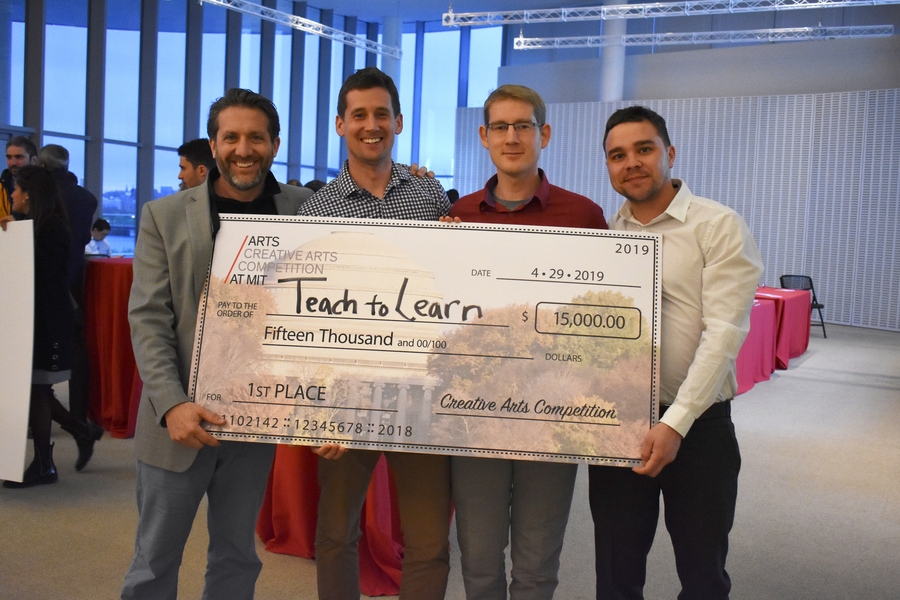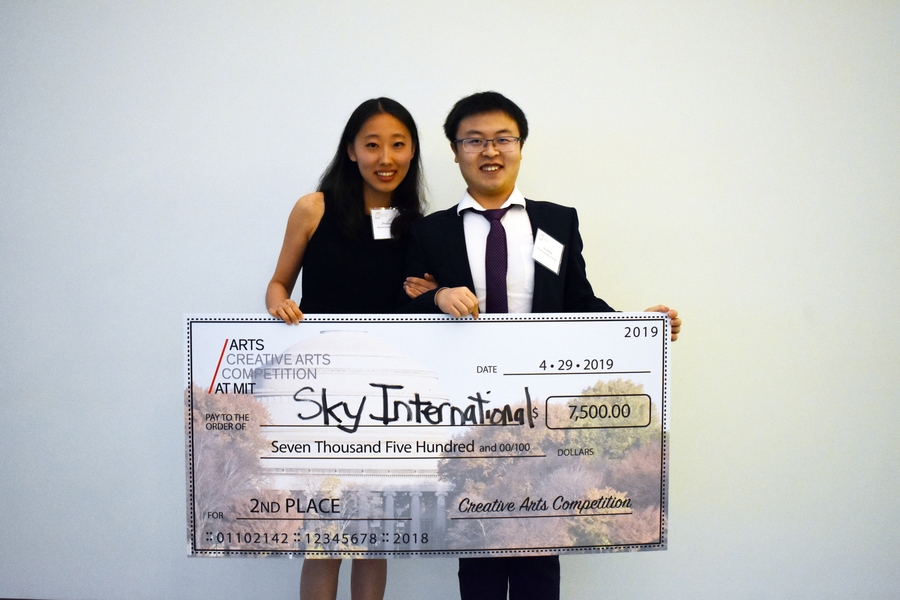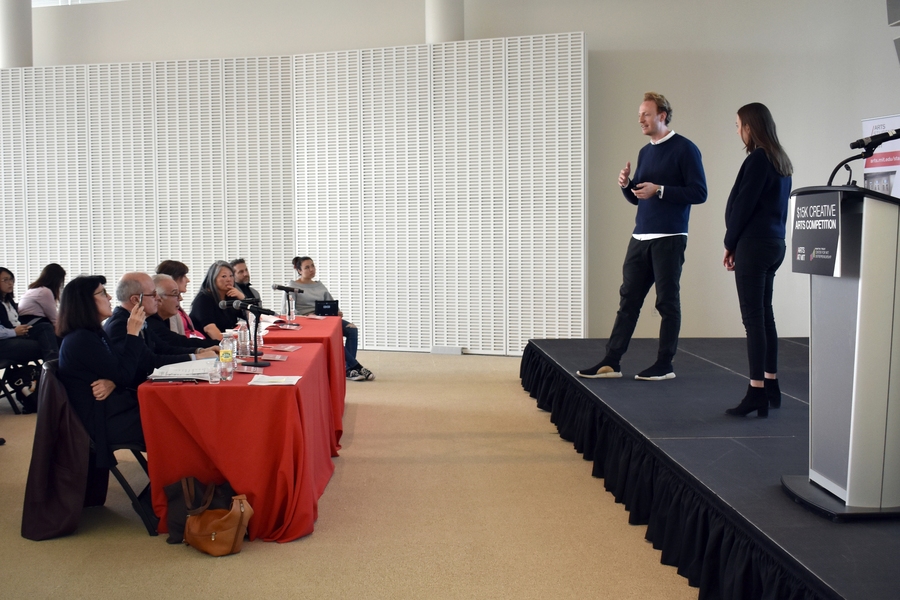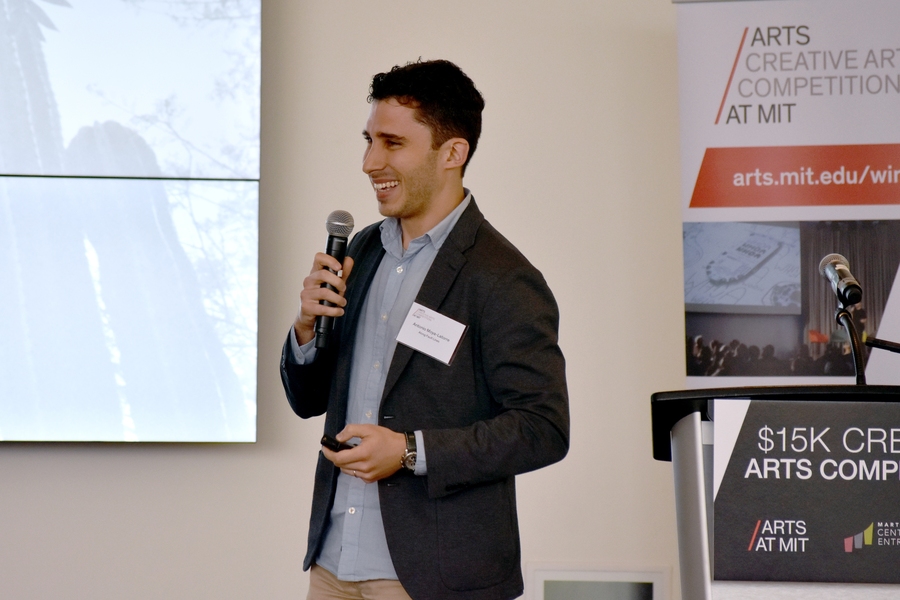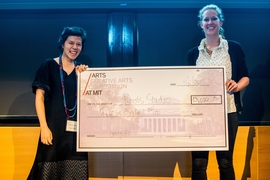Mark Adams '19 worked in agriculture in Zambia. Derek Beckvold taught music in a refugee camp outside of Erbil in Iraq. Robert Jordon gave piano lessons to young people in Afghanistan. Their experiences in the developing world, combined with a shared love of music (Adams is also a musician), inspired the three longtime friends to create “Teach to Learn,” an online global music mentorship program that connects musicians, teachers, and students across the globe.
Teach to Learn won this year’s $15,000 first prize in the MIT Creative Arts Competition. Now in its seventh year, the annual competition encourages art-based entrepreneurship on campus, offering mentorship, support, and cash awards to student teams who present business plans for arts-related initiatives.“This almost feels surreal,” says Jordon, a graduate of the New England Conservatory of Music, after his team was awarded first prize. “But I’d seen Mark’s presentation several times. That convinced me we had a chance.”
Other competition winners include Sky international Music Education, awarded $7,500 for second place in the 2019 competition; ArtNext took the $2,500 third prize; and Along Fault Lines won $750 for the Audience Choice Prize. “Every year we see so many strong ideas at the competition,” says Mary Hale '09, a Boston-area architect and artist who has participated in the Creative Arts Competition judging panel since it began. “I think it’s wonderful that there is so much attention focused on the arts here.”
This year’s competition drew a record 28 teams who submitted their proposals in February. Teams then worked with arts industry mentors to develop a business plan and pitch over the next six weeks. The names of the eight finalists were announced in April. Later that month, the teams pitched their proposals to a panel of judges before a live audience at an event at the Media Lab. “It’s a tough competition,” says Sam Magee, manager of Student Arts Programs at MIT and organizer of the competition. “We had teams with working prototypes and revenues who didn’t make the final eight. But the process that the students go through, starting with defining their idea, to developing their business plan, to working with their mentors, and ultimately honing their pitch, is more important than the prize.”
In addition to working with industry mentors, the eight finalists had an opportunity to refine their pitches with Chris Nolte '15, winner of the 2014 competition, who worked with the teams a week before their final presentations. “This prize was a big validation for our team,” says Nolte, who is now vice president of partnerships at TIDAL (an audio streaming service). “I’m able to leverage the experience in my current role. I’m still grateful to the Arts and MIT team that gave us this fantastic opportunity in 2014.”
Teach To Learn: First Prize
Omar is a cellist in Damascus, Syria; Henry is a cellist in Brooklyn, New York. Each month, the two connect on a video platform to talk about music, technique, and their lives.
This is the essence of Teach to Learn, a global music mentorship program. Founded just two years ago, the program’s U.S.-based mentors already connect over 100 students in 19 countries. “Our company is about music across cultures,” says Teach to Learn team member Derek Beckvold. “But it’s also about listening across cultures.”
Beckvold grew up on Boston’s North Shore with Teach to Learn teammate Mark Adams, and studied with Robert Jordon at the New England Conservatory of Music. While in Iraq, Beckvold watched children in a refugee camp communicate and create an online community with children in Afghanistan. He thought the internet could do the same thing for musicians.
Teach to Learn currently has a pilot program at Masconomet Regional High School in Boxford, Massachusetts (two of the team’s three members are Masconomet graduates). To support its core global mentoring platform, the program’s business model includes two additional platforms to generate revenue: Fellowship, a series of 10-month programs at universities, will culminate in a community music event; Leadership offers professional musicians a platform to teach remotely at high schools.
As a nonprofit company, Teach to Learn will also depend on grant funding and individual and corporate donations. “We can demonstrate the tangible impact of this program for all our stakeholders,” says team member Mark Adams. “There are global connections, there is community building, and there is an opportunity for musicians to share their expertise and earn a living.”
In the coming year, the team will apply its $15,000 prize to expand its high school programs, launch its university collaborations, and develop a unified technical platform for its mentorship initiatives.
Sky International Music Education: Second Prize
There are approximately 280 million children between the ages of 3 and 18 in China. Sky International Music Education CTO Guo Zhang ’19 believes that many of these children would like to study music (or their parents would like them to.) Yet most qualified music instructors live in big cities — out of reach of rural families.
Sky International Music Education is an online music instruction system that connects aspiring Chinese violinists and pianists with expert teachers in their country. The system also employs artificial intelligence tools that assess a student’s progress and suggests practice techniques. Zhang believes his potential market is huge, and ready to be tapped.
ArtNext: Third Prize
ArtNext, an online leasing service, connects art lovers looking to enjoy artworks in their home or workplace with art galleries. ArtNext seeks to tap the nearly 98 percent of all art gallery objects in storage that generate neither revenue nor aesthetic pleasure.
Using ArtNext, galleries could lease their warehoused artworks for a modest monthly fee, providing enjoyment to the client and a reliable and significant revenue stream for the gallery. ArtNext’s team estimates that individual galleries could pocket up to $170,000 each year through the initiative. ArtNext is launching its pilot program in Boston and hopes to enlist 15 percent of that city’s galleries by 2020.
Along Fault Lines: Audience Choice
Art and urban design can serve as a source of hope to people in urban communities that have suffered trauma. Along Fault Lines’ team member Antonio Moya-Latorre, a second-year graduate student at the Department of Urban Studies (DUSP), saw this firsthand during a visit to Mexico’s earthquake-stricken Oaxaca state as it recovered in 2018. While there, he also saw there was room for much broader healing, and how a global pool of artists and urbanists could contribute to that healing.
As a nonprofit donor-funded company, Along Fault Lines matches distressed communities with grassroots arts organizations and artists around the world. Along Fault Lines has launched a pilot program in Oaxaca and intends to expand its reach to other communities around the world that have been impacted by natural disasters, conflict, and endemic poverty.
